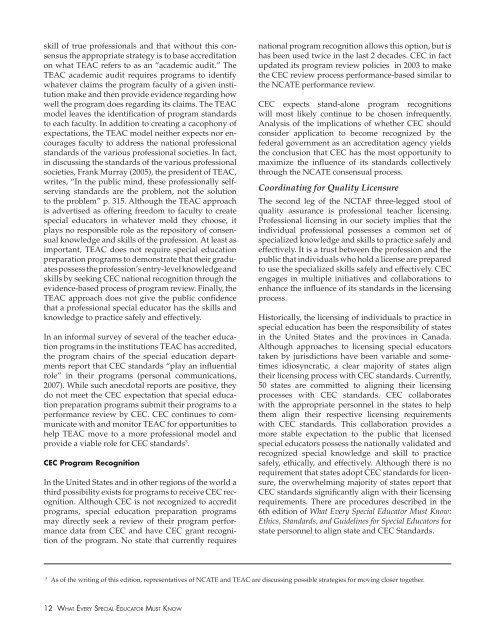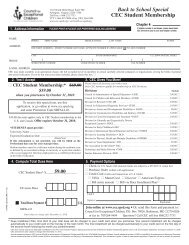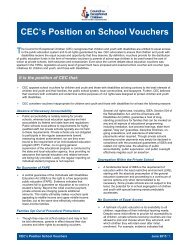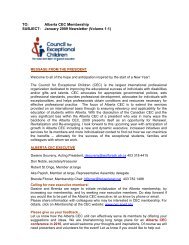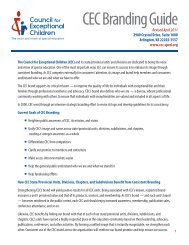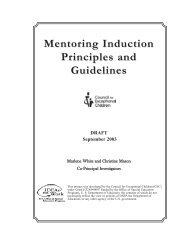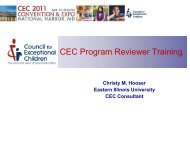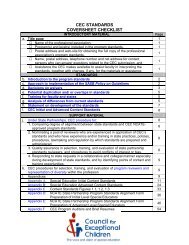What Every Must Know Special Educator - Council for Exceptional ...
What Every Must Know Special Educator - Council for Exceptional ...
What Every Must Know Special Educator - Council for Exceptional ...
You also want an ePaper? Increase the reach of your titles
YUMPU automatically turns print PDFs into web optimized ePapers that Google loves.
skill of true professionals and that without this consensus<br />
the appropriate strategy is to base accreditation<br />
on what TEAC refers to as an “academic audit.” The<br />
TEAC academic audit requires programs to identify<br />
whatever claims the program faculty of a given institution<br />
make and then provide evidence regarding how<br />
well the program does regarding its claims. The TEAC<br />
model leaves the identification of program standards<br />
to each faculty. In addition to creating a cacophony of<br />
expectations, the TEAC model neither expects nor encourages<br />
faculty to address the national professional<br />
standards of the various professional societies. In fact,<br />
in discussing the standards of the various professional<br />
societies, Frank Murray (2005), the president of TEAC,<br />
writes, “In the public mind, these professionally selfserving<br />
standards are the problem, not the solution<br />
to the problem” p. 315. Although the TEAC approach<br />
is advertised as offering freedom to faculty to create<br />
special educators in whatever mold they choose, it<br />
plays no responsible role as the repository of consensual<br />
knowledge and skills of the profession. At least as<br />
important, TEAC does not require special education<br />
preparation programs to demonstrate that their graduates<br />
possess the profession’s entry-level knowledge and<br />
skills by seeking CEC national recognition through the<br />
evidence-based process of program review. Finally, the<br />
TEAC approach does not give the public confidence<br />
that a professional special educator has the skills and<br />
knowledge to practice safely and effectively.<br />
In an in<strong>for</strong>mal survey of several of the teacher education<br />
programs in the institutions TEAC has accredited,<br />
the program chairs of the special education departments<br />
report that CEC standards “play an influential<br />
role” in their programs (personal communications,<br />
2007). While such anecdotal reports are positive, they<br />
do not meet the CEC expectation that special education<br />
preparation programs submit their programs to a<br />
per<strong>for</strong>mance review by CEC. CEC continues to communicate<br />
with and monitor TEAC <strong>for</strong> opportunities to<br />
help TEAC move to a more professional model and<br />
provide a viable role <strong>for</strong> CEC standards 3 .<br />
CEC Program Recognition<br />
In the United States and in other regions of the world a<br />
third possibility exists <strong>for</strong> programs to receive CEC recognition.<br />
Although CEC is not recognized to accredit<br />
programs, special education preparation programs<br />
may directly seek a review of their program per<strong>for</strong>mance<br />
data from CEC and have CEC grant recognition<br />
of the program. No state that currently requires<br />
1 <strong>What</strong> EvEry SpECial EduCator MuSt KnoW<br />
national program recognition allows this option, but is<br />
has been used twice in the last 2 decades. CEC in fact<br />
updated its program review policies in 2003 to make<br />
the CEC review process per<strong>for</strong>mance-based similar to<br />
the NCATE per<strong>for</strong>mance review.<br />
CEC expects stand-alone program recognitions<br />
will most likely continue to be chosen infrequently.<br />
Analysis of the implications of whether CEC should<br />
consider application to become recognized by the<br />
federal government as an accreditation agency yields<br />
the conclusion that CEC has the most opportunity to<br />
maximize the influence of its standards collectively<br />
through the NCATE consensual process.<br />
Coordinating <strong>for</strong> Quality Licensure<br />
The second leg of the NCTAF three-legged stool of<br />
quality assurance is professional teacher licensing.<br />
Professional licensing in our society implies that the<br />
individual professional possesses a common set of<br />
specialized knowledge and skills to practice safely and<br />
effectively. It is a trust between the profession and the<br />
public that individuals who hold a license are prepared<br />
to use the specialized skills safely and effectively. CEC<br />
engages in multiple initiatives and collaborations to<br />
enhance the influence of its standards in the licensing<br />
process.<br />
Historically, the licensing of individuals to practice in<br />
special education has been the responsibility of states<br />
in the United States and the provinces in Canada.<br />
Although approaches to licensing special educators<br />
taken by jurisdictions have been variable and sometimes<br />
idiosyncratic, a clear majority of states align<br />
their licensing process with CEC standards. Currently,<br />
50 states are committed to aligning their licensing<br />
processes with CEC standards. CEC collaborates<br />
with the appropriate personnel in the states to help<br />
them align their respective licensing requirements<br />
with CEC standards. This collaboration provides a<br />
more stable expectation to the public that licensed<br />
special educators possess the nationally validated and<br />
recognized special knowledge and skill to practice<br />
safely, ethically, and effectively. Although there is no<br />
requirement that states adopt CEC standards <strong>for</strong> licensure,<br />
the overwhelming majority of states report that<br />
CEC standards significantly align with their licensing<br />
requirements. There are procedures described in the<br />
6th edition of <strong>What</strong> <strong>Every</strong> <strong>Special</strong> <strong>Educator</strong> <strong>Must</strong> <strong>Know</strong>:<br />
Ethics, Standards, and Guidelines <strong>for</strong> <strong>Special</strong> <strong>Educator</strong>s <strong>for</strong><br />
state personnel to align state and CEC Standards.<br />
3 As of the writing of this edition, representatives of NCATE and TEAC are discussing possible strategies <strong>for</strong> moving closer together.


